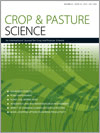
Crop & Pasture Science
Scope & Guideline
Nurturing research that feeds the future.
Introduction
Aims and Scopes
- Crop and Pasture Management:
Research on effective management practices for crops and pastures, including grazing systems, irrigation strategies, and fertilization techniques, aimed at optimizing yield and sustainability. - Plant Breeding and Genetics:
Investigation into genetic diversity, breeding strategies, and the development of crop varieties with improved traits such as drought tolerance, disease resistance, and nutrient density. - Soil and Nutrient Management:
Studies focusing on soil health, fertility, and the impact of fertilization practices on crop yield and quality, including biofortification and micronutrient management. - Environmental Impact and Sustainability:
Research exploring the effects of agricultural practices on the environment, including carbon sequestration, water use efficiency, and the role of cover crops in sustainable systems. - Pest and Disease Management:
Studies addressing the management of crop diseases and pests, including the use of resistant varieties, biological control, and integrated pest management strategies.
Trending and Emerging
- Climate Resilience and Adaptation:
Research focusing on developing crops and pasture systems that can withstand climate change impacts, such as drought and heat stress, is increasingly prominent, highlighting the urgent need for adaptation strategies. - Digital Agriculture and Precision Farming:
The integration of digital technologies and precision farming techniques is gaining traction, with studies exploring data-driven approaches for optimizing crop management and resource allocation. - Sustainable Practices and Agroecology:
There is a growing emphasis on sustainable agricultural practices, including agroecological approaches that promote biodiversity, soil health, and reduced chemical inputs, aligning with global sustainability goals. - Microbial Interactions and Soil Health:
Research into the role of soil microbiomes and plant-microbe interactions is emerging as a critical area, focusing on how these relationships can enhance plant health and productivity. - Biofortification and Nutritional Quality:
The trend towards enhancing the nutritional quality of crops through biofortification is increasing, with a focus on improving micronutrient content to address global malnutrition issues.
Declining or Waning
- Traditional Fertilization Practices:
Research on conventional fertilization methods has decreased, possibly due to a growing interest in sustainable and organic farming practices that seek to minimize chemical inputs. - Single-Crop Systems:
There is a waning interest in studies focused solely on single-crop systems, as agroecological approaches and intercropping strategies gain more attention for their benefits in biodiversity and resilience. - Historical Crop Varieties:
The focus on historical or heritage crop varieties has diminished, with more emphasis now placed on modern breeding techniques and genetically modified organisms (GMOs) for enhanced performance.
Similar Journals

Frontiers in Agronomy
Empowering Researchers to Transform AgronomyFrontiers in Agronomy, published by FRONTIERS MEDIA SA, is a premier open-access journal dedicated to the dynamic field of agronomy. Launched in 2019, it has rapidly established itself as a leader in the publication of groundbreaking research, holding a distinguished Q1 ranking in several categories including Agricultural and Biological Sciences, Agronomy and Crop Science, Plant Science, and Soil Science as of 2023. With an impressive Scopus ranking that positions it among the top journals in its field, this journal provides a valuable platform for researchers, professionals, and students alike to disseminate and access innovative research and critical insights in agronomy. Every contribution to Frontiers in Agronomy undergoes rigorous peer review, ensuring that high-quality research remains at its core. Accessible to all since its inception, it serves as a vital resource for advancing knowledge and fostering collaboration within the global agronomic community, supporting the quest for sustainable agricultural practices and enhanced crop productivity.
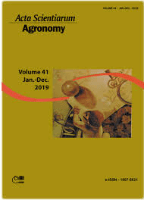
ACTA SCIENTIARUM-AGRONOMY
Connecting researchers to the pulse of agricultural innovation.ACTA SCIENTIARUM-AGRONOMY is a prestigious, peer-reviewed journal published by UNIV ESTADUAL MARINGA, PRO-REITORIA PESQUISA POS-GRADUACAO, focusing on advanced research in the field of agronomy and crop science. Since its inception as an Open Access journal in 2007, it has significantly contributed to disseminating high-quality research, allowing unrestricted access to its content for a global audience. Operating from Brazil, the journal holds a notable Q2 category ranking in Agronomy and Crop Science as of 2023, validating its importance within the academic community. The journal’s Scopus ranking positions it in the 49th percentile among Agricultural and Biological Sciences, indicating a robust foundation for impactful research. With a commitment to innovation and scientific excellence, ACTA SCIENTIARUM-AGRONOMY aims to provide researchers, professionals, and students with vital insights that drive forward our understanding of agriculture and its environmental implications.

Legume Research
Unlocking the Potential of Legumes for Global ImpactLegume Research, published by the AGRICULTURAL RESEARCH COMMUNICATION CENTRE in India, is an essential peer-reviewed journal focusing on advancements in the field of agronomy, crop science, soil science, and plant science. With an ISSN of 0250-5371 and operating since 2008, this journal caters to researchers, agricultural professionals, and students interested in the critical role of legumes in sustainable agriculture and food security. It ranks within the third quartile (Q3) in several prominent categories, reflecting its contribution to the agricultural and biological sciences community—ranking #279 in Agronomy and Crop Science, #113 in Soil Science, and #376 in Plant Science based on Scopus metrics. Although not open access, Legume Research remains a vital resource for those seeking to enhance their knowledge and contribute novel research findings in the ever-evolving discipline of legume cultivation and utilization. With a clear objective to disseminate impactful research, this journal significantly contributes to the global understanding of legumes' ecological, economic, and nutritional importance.

CEREAL RESEARCH COMMUNICATIONS
Cultivating knowledge for food security and sustainability.Cereal Research Communications is a premier academic journal published by Springer Heidelberg, dedicated to advancing knowledge in the field of agri-food science with a particular focus on agronomy, crop science, genetics, and physiology. With a strong reputation reflected in its Q2 ranking in Agronomy and Crop Science, this journal serves as a vital resource for researchers, professionals, and students alike. Published in Hungary, the journal facilitates the dissemination of innovative research and practice, covering a broad spectrum from crop genetics to physiological processes, thereby fostering a multidisciplinary dialogue among scholars. The journal has maintained a consistent publication record since its inception in 1993 and will continue its commitment to academic excellence and relevance through 2024. Although it operates under a subscription model, its contributions are crucial for those engaged in improving crop productivity and sustainability. For those looking to connect with cutting-edge research and contribute to the food security dialogue, Cereal Research Communications remains an essential platform in the field.

Zemdirbyste-Agriculture
Harvesting insights for a resilient agricultural landscape.Zemdirbyste-Agriculture is a prominent journal dedicated to advancing the field of agricultural sciences, with a particular focus on agronomy and crop science. Published by the Lithuanian Research Centre Agriculture & Forestry, this open access journal has been fostering knowledge sharing and scientific discourse since 2004, allowing researchers, professionals, and students unrestricted access to its content. Located in the beautiful country of Lithuania, specifically at Vytautas Magnus University, this journal plays a significant role in disseminating innovative research findings. With a 2023 Scopus ranking of #246 out of 406 in the category of Agricultural and Biological Sciences, Zemdirbyste-Agriculture falls within the Q3 quartile, reflecting its growing influence in the academic community. This journal, which has converged its publication focus from 2008 to 2023, aims to provide a platform for scientists to share their critical insights on agricultural practices, sustainability, and technological advancements in crop science, thereby contributing to the global discourse on food security and environmental health.
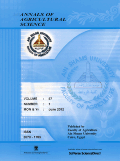
ANNALS OF AGRICULTURAL SCIENCES
Leading the Way in High-Impact Agricultural ResearchANNALS OF AGRICULTURAL SCIENCES, published by Elsevier, stands as a leading open access journal dedicated to the multifaceted field of agricultural sciences. Since its inception in 2011, this journal has served as a pivotal platform for the dissemination of high-quality research, covering areas such as agronomy, animal science, horticulture, food science, plant science, and soil science. With an impressive Q1 ranking across multiple disciplines and notable positions in Scopus Ranks—including #6 in Animal Science and Zoology and #3 in Horticulture—this journal is recognized globally for its significant contribution to advancing agricultural innovations. The journal caters to a diverse audience of researchers, professionals, and students, providing them with open access to cutting-edge studies that address critical issues in agricultural productivity and sustainability. Its commitment to high-impact research ensures that articles contribute meaningfully to the scientific community, fostering advancements in agricultural practices and policies.
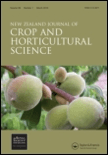
NEW ZEALAND JOURNAL OF CROP AND HORTICULTURAL SCIENCE
Cultivating Knowledge in Crop and Horticultural ScienceThe New Zealand Journal of Crop and Horticultural Science, published by Taylor & Francis Ltd, stands as a key resource in the fields of Agronomy and Horticulture, with a commendable impact factor reflecting its quality and influence in the scientific community. Since its inception in 1989, this journal has been committed to advancing our understanding of crop development and horticultural practices, catering not only to researchers and professionals but also to students eager to delve into the intricacies of plant sciences. With a Q3 ranking in both Agronomy and Crop Science and Horticulture as of 2023, the journal occupies a significant position within the agricultural and biological sciences domain, significantly contributing to the body of knowledge in these fields. The journal features original research, reviews, and technical notes that cover a wide range of topics, ensuring a comprehensive perspective on contemporary and emerging agricultural issues. For individuals interested in accessing cutting-edge research, the journal provides subscription-based access, further enhancing its scholarly contributions.

Agricultural Science and Practice
Pioneering insights in agronomy and allied fields.Agricultural Science and Practice is a pivotal journal dedicated to advancing knowledge and research in the field of agricultural sciences. Published by the NATIONAL ACADEMY OF AGRARIAN SCIENCES OF UKRAINE, this journal serves as a vital resource for researchers, professionals, and students engaged in agriculture, agronomy, and related disciplines. The journal aims to disseminate high-quality, peer-reviewed articles that address contemporary issues, innovative practices, and advancements in agricultural methodologies. While currently specified as non-open access, the journal endeavors to contribute significantly to the global agricultural knowledge pool while fostering a collaborative research environment. With its base in Kyiv, Ukraine, Agricultural Science and Practice plays an essential role in highlighting regional agricultural challenges and solutions, thereby attracting a diverse readership that aspires to enhance food security and sustainable farming practices worldwide.
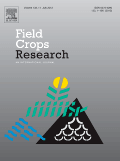
FIELD CROPS RESEARCH
Pioneering Discoveries in Agronomy and Soil ScienceFIELD CROPS RESEARCH is a premier academic journal published by Elsevier, dedicated to advancing knowledge in the fields of Agronomy and Crop Science as well as Soil Science. Now in its 46th year of publication, this esteemed journal has established itself as a leading resource, holding a prestigious Q1 ranking in both the Agronomy and Soil Science categories, with a remarkable blend of rigorous peer-reviewed research and innovative findings. With a Scopus ranking of #27/406 in Agronomy and #20/159 in Soil Science, and a notable 93rd and 87th percentile respectively, FIELD CROPS RESEARCH plays a vital role in informing practices that drive sustainable agriculture and optimize crop production. Although not an open access journal, it remains highly accessible to the global research community and offers critical insights that influence policy and agricultural practices worldwide. Researchers, professionals, and students are encouraged to delve into this journal, as it continues to shape the future of field crop research through impactful studies and comprehensive reviews.

INDIAN JOURNAL OF AGRICULTURAL SCIENCES
Connecting scholars to transform agricultural sciences.Welcome to the Indian Journal of Agricultural Sciences, a vital resource for researchers and professionals in the field of agricultural sciences, published by the esteemed Indian Council of Agricultural Research. Established in 1974, this journal aims to disseminate high-quality research and developments in agronomy and crop science, facilitating knowledge exchange and advancement within the agricultural community. Though currently classified in the Q4 category according to 2023 data, it provides an essential platform for publication, contributing valuable insights towards sustainable agricultural practices. With an ISSN of 0019-5022 and an E-ISSN of 2394-3319, the journal houses important research that spans decades of convergence and collaboration, promoting innovation in agriculture across India and beyond. As an open access platform, it invites contributions that reflect a wide array of agricultural disciplines to foster sustainable food systems that address the challenges of food security. Join the network of scholars and practitioners by sharing your research and engaging with the profound work being done in this transformative field.